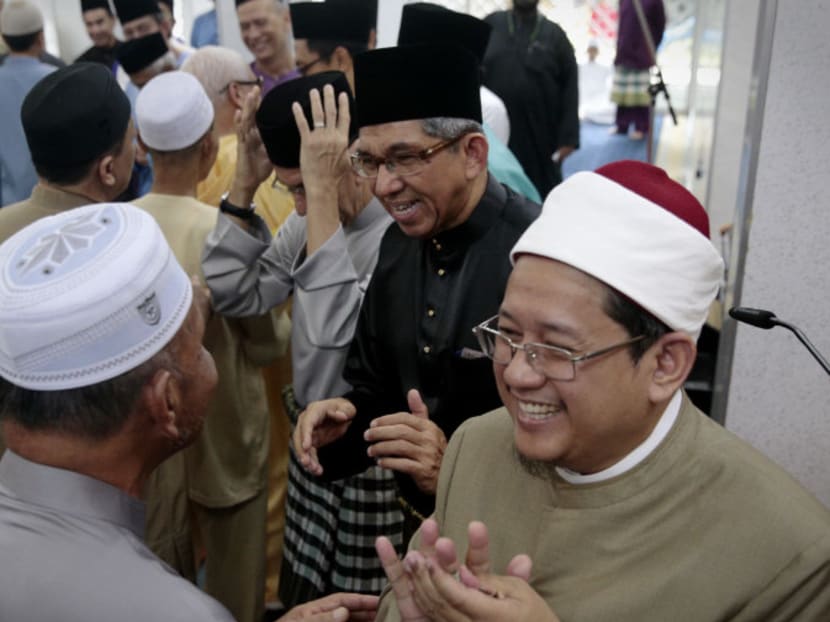Mufti: S’pore Muslims should reject hateful teachings, isolationism
SINGAPORE — The Muslim community here should not let themselves be trapped by a “siege mentality”, feeling that they are being attacked or oppressed, and should reject teachings that sow the seeds of hatred towards others, said the mufti of Singapore, Dr Mohamed Fatris Bakaram, in his Eidilfitri sermon on Wedneday (July 6).

The Muslim community here should not let themselves be trapped by a “siege mentality”, feeling that they are being attacked or oppressed, said the mufti of Singapore, Dr Mohamed Fatris Bakaram (far right). Beside him is Dr Yaacob Ibrahim, Minister-in-charge of Muslim Affairs.
SINGAPORE — The Muslim community here should not let themselves be trapped by a “siege mentality”, feeling that they are being attacked or oppressed, and should reject teachings that sow the seeds of hatred towards others, said the mufti of Singapore, Dr Mohamed Fatris Bakaram, in his Eidilfitri sermon on Wedneday (July 6).
Addressing some 4,000 attendees during a prayer session at Ar-Raudhah Mosque on Wednesday morning, Dr Fatris, speaking in Malay, said some groups have claimed that Muslims must isolate themselves to preserve their faith. But those of strong faith should be “more confident” and interact with fellow Muslims, as well as those of different beliefs, he said.
“The early Muslim communities, equipped with confidence emanating from a deep sense of taqwa (God-conscious) have always been interacting with communities from different faith groups, mazhabs, races and inclinations,” said Dr Fatris, who is Singapore’s top Muslim religious leader.
“The more they learn and understand their religion, the more confident they were that their religion, and their faith will not easily be watered down simply by participating and contributing to the larger society,” he added.
He noted that some Muslim seem to have “lost confidence in the religion as well as themselves”, claiming that contemporary forms of governance are devoid of Islamic values.
But generations of Muslims here have practiced a form of Islamic thought that respected the freedom of religion and honoured the rights of minorities. “This is the type of Islamic values that need to be nurtured by leaders, scholars and the community alike,” he said.
Dr Fatris noted how this year, some mosques have been organising programmes for non-Muslims to explain the beauty of fasting through community breaking of fast events. Several non-Muslim organisations have also donated to Muslim organisations during this period, such as the Singapore Buddhist Lodge donating 20 tonnes of rice.
Meanwhile, extremist groups have blatantly “defiled the sanctity of the month of Ramadan” with a string of terror attacks in Istanbul, Baghdad, Dhaka, Kuala Lumpur, and most recently, Medina.
“It must be our duty to strongly reject this ideology of violence, and also to reject all teachings that sow the seeds of hatred towards others, whether they share our faith or are from a different faith,” Dr Fatris said. “Hatred leads to discord, and discord creates a fertile ground which radical and extremist groups can and will exploit for their heinous agenda.”
Stressing that Islam is based on knowledge, rationality and open-mindedness, Dr Fatris said it was time for the Muslim community “to exercise maturity in dealing with issues of differing opinions.”
Dr Yaacob Ibrahim, Minister-in-charge of Muslim Affairs, who was at the prayer session, noted the timeliness of the mufti’s message in continuing to reach out to both Muslims and non-Muslims to preserve social harmony here.
He also said the attacks serve as a reminder on the need for Muslims to stay united and not allow the advocacy of violence to take root in Singapore.
“We must not lose hope,” he said. “(These extremist groups) will continue to strike to dampen our spirits, to make sure we are weakened, (but) we should not.”
As for those who might have strayed onto deviant teachings, Dr Yaacob stressed that there is always a way out.
For example, there are those who have been detained for aiding the Islamist terrorist group Jemaah Islamiyah, and the goal is rehabilitation, not incarceration for the rest of their lives, he said.
“At the end of the day, Islam is such a religion where you can forgive and forget,” added Dr Yaacob. “If you are prepared to come back to the straight path, we are prepared to embrace you”.






